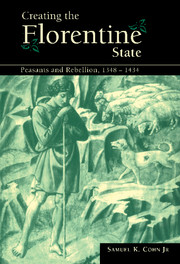Book contents
- Frontmatter
- Contents
- List of illustrations
- List of tables
- Acknowledgements
- Note on citations, dates, and measures
- Introduction
- PART I CULTURE, DEMOGRAPHY, AND FISCALITY
- PART II PEASANT PROTEST IN THE MOUNTAINS: THREE VIEWS
- 4 Peasant insurrection in the mountains: the chroniclers' view
- 5 Peasant insurrection in the mountains as seen in the criminal records
- 6 Rebellion as seen from the provvisioni
- PART III GOVERNMENTAL CLEMENCY AND THE HINTERLAND
- Conclusion
- Appendix 1 Regression models: wealth, migration, and taxes
- Appendix 2 Tax coefficients, 1354–1423
- Bibliography
- Index
6 - Rebellion as seen from the provvisioni
Published online by Cambridge University Press: 07 August 2009
- Frontmatter
- Contents
- List of illustrations
- List of tables
- Acknowledgements
- Note on citations, dates, and measures
- Introduction
- PART I CULTURE, DEMOGRAPHY, AND FISCALITY
- PART II PEASANT PROTEST IN THE MOUNTAINS: THREE VIEWS
- 4 Peasant insurrection in the mountains: the chroniclers' view
- 5 Peasant insurrection in the mountains as seen in the criminal records
- 6 Rebellion as seen from the provvisioni
- PART III GOVERNMENTAL CLEMENCY AND THE HINTERLAND
- Conclusion
- Appendix 1 Regression models: wealth, migration, and taxes
- Appendix 2 Tax coefficients, 1354–1423
- Bibliography
- Index
Summary
Florence's day-to-day approval of petitions and promulgation of laws and decrees called the provvisioni show another side to the highlanders' revolts in 1402 not disclosed by the chronicles or the judicial records. In addition to portraying peasants as the leaders of insurrections in the Florentine Alps, even more so than the criminal records the decrees show a remarkable fact in the social history of Europe – villagers as victors of insurrection, who successfully negotiated special privileges and fiscal exemptions for themselves and their communities against their overlords, in this case the republican Commune of Florence.
The legislative machinery that approved these petitions and decrees relied on Florence's highest elected councils. The Tre Maggiori (comprised of the Priors of the guilds and the Gonfaloniere of Justice, the Gonfalonieri of the sixteen companies or neighborhoods of the city, and the Twelve Good Men) determined which bills or petitions could proceed to be voted on by the larger legislative assemblies of the People (Popolo) and the Commune. Often other special committees, such as the Ten of War, assisted the Tre Maggiori in the selection of bills. The debates over some of these issues were preserved in volumes called the Consulte e Pratiche, but deliberations over matters such as peasant petitions, even when they involved issues as important as rebellion, find few traces in these records.
- Type
- Chapter
- Information
- Creating the Florentine StatePeasants and Rebellion, 1348–1434, pp. 172 - 194Publisher: Cambridge University PressPrint publication year: 1999



